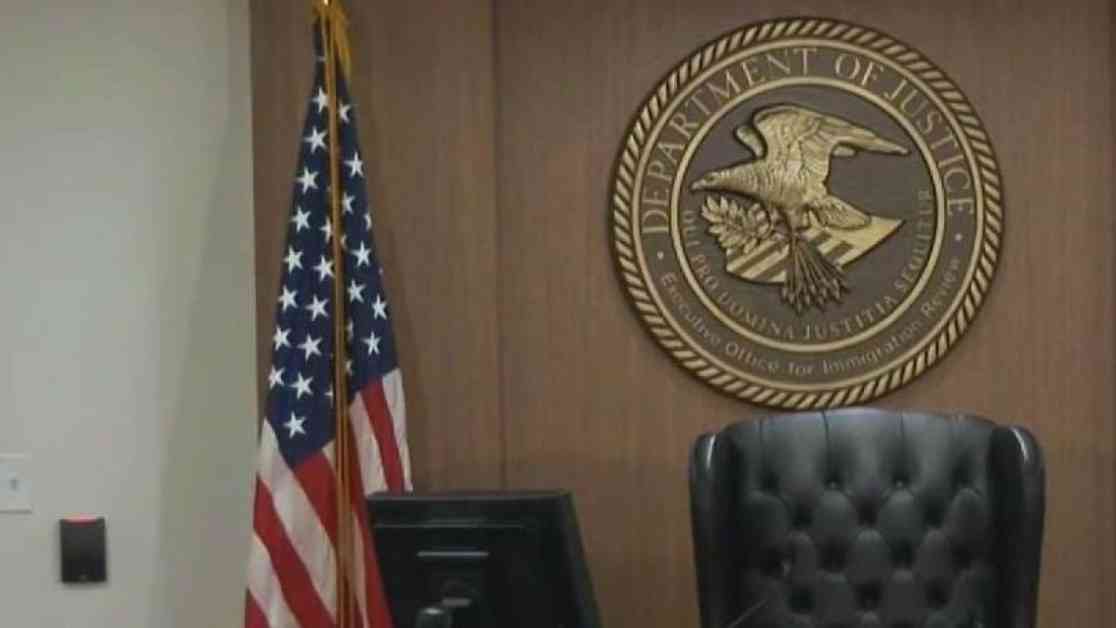Immigration System Overwhelmed by 3.7M Case Backlog
In Elgin, Illinois, a recent incident involving U.S. Marshals sparked a chain of events highlighting the challenges faced by immigration courts across the United States. Last week, officials breached the door of a home in search of Jose Ramos, a man wanted for serious criminal charges. However, the operation took an unexpected turn when they apprehended Raul Lopez Garcia, the father of the wanted man.
As the bewildered family watched law enforcement search their home, emotions ran high. Bethzy Lopez, one of Lopez Garcia’s daughters, expressed their confusion, stating that her father was not the intended target. Despite this, the situation escalated into an immigration case when it was revealed that Lopez Garcia was undocumented and subsequently detained.
The Lopez family’s story is just one of many unfolding across the country as immigration enforcement efforts intensify. President Donald Trump’s push for stricter immigration policies has led to a series of high-profile arrests, adding to an already staggering backlog of cases in the nation’s immigration courts. According to Syracuse University’s database, the backlog currently stands at over 3.7 million cases, straining the already overwhelmed system.
Challenges Faced by Immigration Courts
Chicago-based immigration attorney Chris Kurczaba shed light on the dire situation, emphasizing the system’s struggle to keep up with the growing caseload. He pointed out that major cities like Chicago, New York, and Los Angeles are particularly affected, with court timelines stretching longer due to the influx of cases.
A study by the Congressional Research Service revealed the daunting reality of the backlog, indicating that even with additional judges, it could take up to a decade to clear. Retired immigration court judge James Fujimoto underscored the magnitude of the issue, noting that the sheer volume of cases assigned to each judge is overwhelming. With over 600 immigration judges today, the system continues to grapple with efficiency and timeliness.
According to Fujimoto, the complexities of the immigration court system, which operates under the Department of Justice, pose significant challenges. The court’s funding and priorities can shift based on political influences, making it difficult to address the backlog effectively. The Trump administration’s efforts to expedite deportations further complicate the situation, leaving many individuals uncertain about their legal status and court proceedings.
Uncertain Future for Immigrants
For families like the Lopezes, the fear of deportation looms large. Bethzy and Janeth expressed concerns about their father’s fate, unsure of what lies ahead. With no previous attempts to obtain citizenship or work permits, Lopez Garcia’s case underscores the vulnerability of undocumented individuals caught in the web of immigration enforcement.
As NBC 5 Investigates sought clarity from the White House on potential solutions to the backlog, questions remained unanswered. The lack of response underscores the ongoing challenges faced by immigration courts and the urgent need for reform to address the growing crisis.
In the midst of political debates and policy changes, the human stories behind each case highlight the profound impact of immigration policies on families and communities. As the nation grapples with an overburdened system, the call for comprehensive reform and compassionate solutions grows louder. Only time will tell how the immigration courts navigate the complexities ahead and provide justice for those caught in the crossfire.












